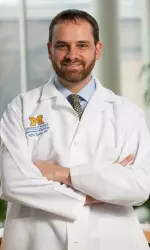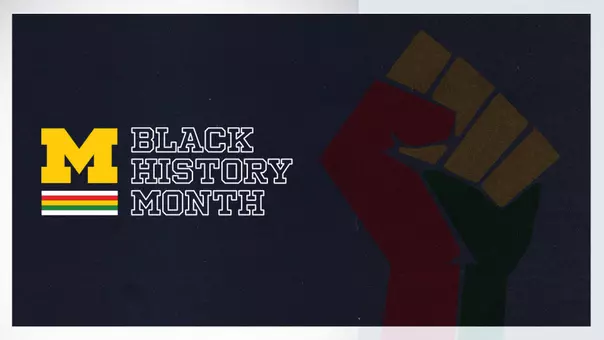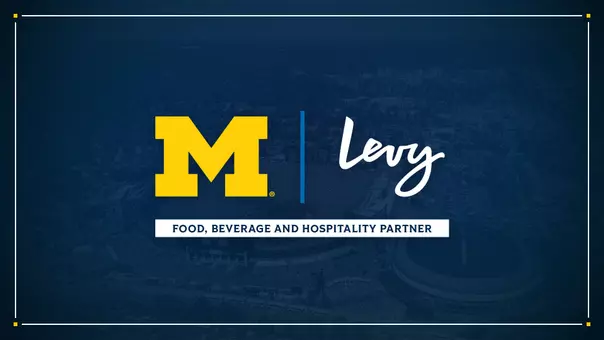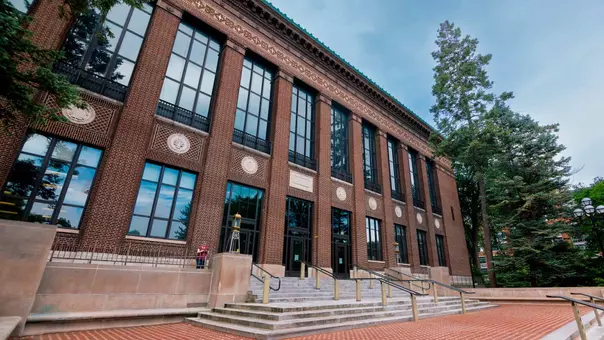
U-M Medical School is Leader in Sports Neurology
12/21/2009 12:00:00 AM | General
Dec. 21, 2009
By Joanne C. Gerstner
It used to be a badge of honor for an athlete take a knock to the head and keep playing. The athlete was praised for toughness, dedication and being able to play through obvious injury. Times have thankfully changed, with medical science and views on sports evolving to stronger awareness of the dangers of concussions.
The University of Michigan Medical School is taking a leading interest in the growing field of sports neurology, through its NeuroSport program. Dr. Jeffrey Kutcher, a sports neurologist, U-M assistant professor of neurology and director of NeuroSport, works with Wolverine student-athletes and teams from Eastern Michigan University and local high schools.
"There is so much misinformation out there that we are fighting to correct about concussive situations, but the good news is the doctors, trainers, coaches, parents and the athletes are taking the initiative to educate themselves," Kutcher said. "We have come a long way in the level of community education at the youth and high school levels, but it's certainly far from perfect.
"A concussion is a very individual thing -- the symptoms vary from person to person, along with the healing time. No two concussions are the same. You have to treat everyone individually."
Kutcher was recently named as the first section chair for the American Academy of Neurology's new division of sports neurology. He understands sports, as he grew up in Dearborn playing hockey and still plays recreationally.
He said the most dangerous time for an athlete occurs after the concussion has occurred. An athlete may be not be properly diagnosed with the injury, and then return to play too soon.
Concussions can result from a direct blow to the head, such a jarring helmet-to-helmet contact during a football tackle. Other in-game situations during wrestling matches, water polo or rugby scrums can also lead to a head snapping back with violent force -- leading to a concussion.
One medical theory of concussions states that taking part in athletic activity while still in a concussed state means the athlete is at a higher risk of a repeat concussion -- this time from less contact. There are also some athletes that were biologically predisposed to being prone to concussions, and unfortunately discover that fact through injury.
Kutcher likes to take a hands-on approach, often roaming the sidelines of Michigan football games to observe play.
"I have seen hits that didn't seem like much on the field, but when the player came off, it was clear he was exhibiting signs of a concussion," Kutcher said. "The key is, when that happens, that the athlete is immediately taken out of the game. No questions asked. You're out of practice, out of the game until you are healed. There should be no playing with a concussive injury.
"And I am very happy to say the U-M football staff totally gets that. They want the best for their players, just as I do."
Athletes, and sometimes their coaches, can be very enthusiastic about returning to a normal sports schedule as soon as possible after a concussion. Players are often very focused, allowing them to ignore or overcome injuries.
But ignoring the need to allow a concussed brain to heal can come with serious consequences.
"You don't want to cross that line, where the memory loss or personality changes may be irreversible," Kutcher said. "There are sometimes devastating outcomes from second impact syndrome, even death. They're all very important reasons why you want to deal with the concussion up front and manage it the right way."
Kutcher hopes to educate coaches, trainers and fellow physicians about the need to properly recognize concussions and advocate for the correct treatment. Since concussions vary from person to person, one simply cannot look for the previously held universal signs such as headaches or blurred vision.
Kutcher advises monitoring the athlete, watching for any signs of an altered personality or pain. He recommends seeing a sports neurologist if there is lingering concern about a possible concussion.
"Not all headaches mean there is a concussion," Kutcher said. "It's much more complicated than that."
U-M's sports neurology program will work on research and train future physicians in the specialty, as well as treating patients. Being next door to Michigan's elite student-athletes is a win-win situation: Kutcher can help them, and the athletes can assist Kutcher in widening the knowledge of sports neurology.
"Our program is really one-of-a-kind right now, and we're really proud of it," Kutcher said. "We're at the forefront of this, and I think we're going to be able to make some really good changes, from everybody from youth athletes up to professional ones."
• U-M Department of Neurology | Michigan NeuroSport
• Berenson Knows Concussion Effects First-Hand (12/17/09) | Jason Botterill: From the Ice to Risk to the Front Office (12/14/09)










